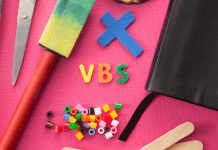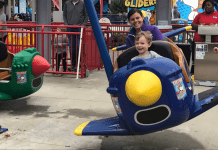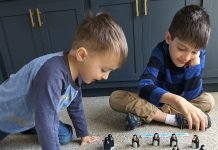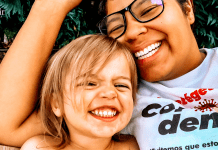It is obvious that our kids have been significantly affected by the COVID-19 pandemic. Across the country, restrictions have eased up slightly, but the outbreak is certainly still prevalent. With schools closing early nationwide, social/physical distancing continuing, and having been quarantined at home, kids are bound to ask questions. Depending on their age, the questions may be broad or more in-depth. Older children may be feeling isolated, anxious, fearful, bored, and/or uncertain. Younger children may not be asking questions, but showing confusion over the lack of social interactions.
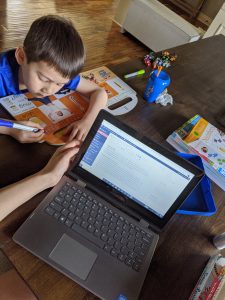 As much as many of us, as adults, are struggling to process our thoughts and feelings in the midst of this pandemic, children are having just as hard of a time. If not, harder. There’s a struggle to understand feelings and situations much bigger than their hearts and minds can handle. I witnessed this first-hand when my oldest son had a bit of a breakdown one day as we were leaving the house for a grocery pickup run.
As much as many of us, as adults, are struggling to process our thoughts and feelings in the midst of this pandemic, children are having just as hard of a time. If not, harder. There’s a struggle to understand feelings and situations much bigger than their hearts and minds can handle. I witnessed this first-hand when my oldest son had a bit of a breakdown one day as we were leaving the house for a grocery pickup run.
Since the beginning of the stay-at-home order, he has asked about our change in grocery routine. It’s been two months since we stepped foot into a grocery store, when it used to be our regular tradition together. He loved grabbing a free banana or orange and getting a free cookie at the store. I loved that snack time and grocery shopping could be simultaneously checked off my list. On this particular day, my son adamantly refused to put on his shoes and get in the car. I patiently asked him why, but he just fought me on it. Finally, he burst into tears and exclaimed, “I don’t want to go outside! I don’t want to get sick!” My mama heart shattered into pieces. I cried. I hate this stupid virus.
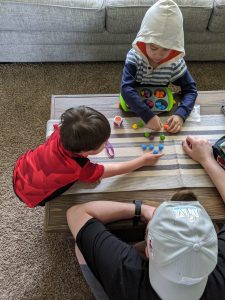 That was the first time I had to have a conversation with my kid about COVID-19. Is there a right and wrong way to handle that? I have no idea. Like everyone else, I’m just doing the best I can. I told my son many people are sick right now and it is best for our health and safety to stay home. Why are people wearing masks? Will we get sick? He kept the questions coming, and I tried my best to explain honestly.
That was the first time I had to have a conversation with my kid about COVID-19. Is there a right and wrong way to handle that? I have no idea. Like everyone else, I’m just doing the best I can. I told my son many people are sick right now and it is best for our health and safety to stay home. Why are people wearing masks? Will we get sick? He kept the questions coming, and I tried my best to explain honestly.
On several occasions since then, we’ve had more in-depth discussions about the pandemic and why life is different right now than what we’re used to. We all need to look out for each other, and that looks like wearing masks, social distancing, and no play dates. Children are sensitive and smart. Even my 2-year-old has started to say things like, “Some people are sick, so we need to stay home.” Kids know things are weird these days, the world seems a little off. Curiosity will be expressed, questions will be asked, so we need to be prepared.
My advice is to keep your answers simple and age-appropriate. Let your child(ren) lead. Ask them what they already know about the coronavirus. Maybe you’ll just scratch the surface, maybe you’ll get real in-depth. The point is to be sensitive to their age and comprehension level. For an older kid, a conversation may make sense. For a young child, perhaps utilizing pretend play would be best. Have a teddy bear doctor’s clinic as a way to explain wearing masks, germs, and caring for others when they’re sick.
There are CDC recommendations and tips from PBS to help kids cope with the changes in daily life, caused by COVID-19. Additionally, there is a book, My Hero is You, written for children affected by the pandemic all over the world. It is appropriate for parents/caregivers to read to children ages 6 and up. Another book, Fighting the Big Virus: Trinka, Sam, and Littletown Work Together, is a story about how sheltering in place can help our families and communities during this time. There is also a companion booklet and parent guide that goes with the story to assist parents with tackling questions kids may have about the pandemic.
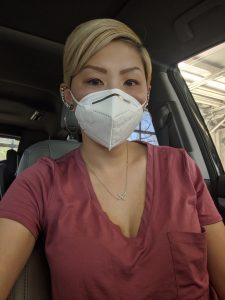 While it’s important to welcome questions, be honest about what you do and don’t know. There is an obvious amount of uncertainty during this time, and we’re not going to have all the answers. That’s ok. Children appreciate transparency. As with all stressful times in your children’s lives, just be available. Teach your kids the things they can do to minimize spread and stay healthy, like washing hands and respecting people’s space. This will give them a sense of empowerment and control over the manageable little things. Constantly get a temperature check on where your kids are mentally and emotionally.
While it’s important to welcome questions, be honest about what you do and don’t know. There is an obvious amount of uncertainty during this time, and we’re not going to have all the answers. That’s ok. Children appreciate transparency. As with all stressful times in your children’s lives, just be available. Teach your kids the things they can do to minimize spread and stay healthy, like washing hands and respecting people’s space. This will give them a sense of empowerment and control over the manageable little things. Constantly get a temperature check on where your kids are mentally and emotionally.
Ultimately, reassure your kids that they are heard, loved, and safe.



